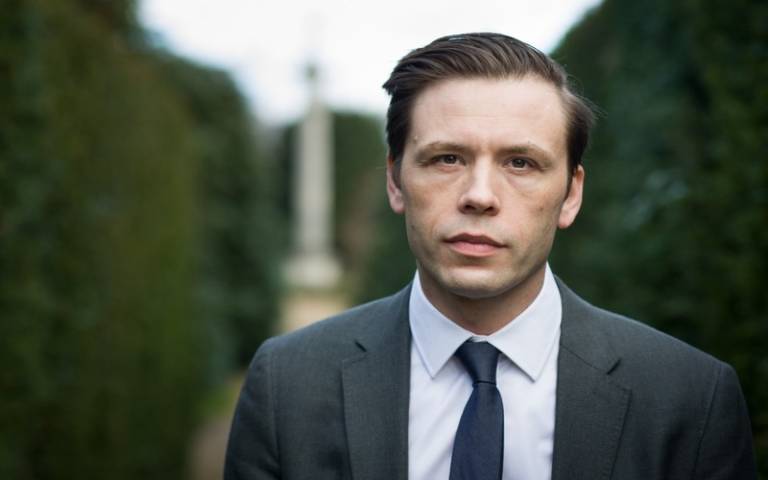Spotlight on... Ciaran Hill
16 January 2024
This week we meet Ciaran Hill, Academic Consultant Neurosurgeon and Honorary Associate Professor. Ciaran tells us about his experience setting up a new iBSc focused on the science underpinning neurosurgical diseases, his research on Glioblastoma and his favourite dystopian novel.

What is your role and what does it involve?
I am an Academic Consultant Neurosurgeon and Honorary Associate Professor. This is a busy and diverse job. My clinical work is concentrated at The National Hospital for Neurology and Neurosurgery where I have a high-volume general and subspecialist neuro-oncology practice. I deal with a broad spectrum of emergency and elective neurosurgical care including disorders of both brain and spine. My subspeciality practice includes advanced techniques in neurosurgical care such as awake craniotomies, brain mapping, intraoperative MRI, and minimally invasive techniques.
This clinical work dovetails with my research at the UCL Cancer Institute. Here I use a variety of preclinical models and patient-gifted human tissue to investigate and further our understanding of fundamental biological mechanisms of brain cancer. UCL is an excellent environment to translate new discoveries into clinical practice and I expect this to be a major focus in the coming 5 years.
How long have you been at UCL and what was your previous role?
I’ve been in my current post since 2022 but I have a much long relationship with UCL and the associated hospitals. I first worked here in 2007 when I lived above the Old Elizabeth Garrett Hospital that used to be opposite the Jeremy Bentham Pub – which was a familiar landmark before it closed a few years ago. My previous post was also a split academic-research post as an Academic Clinical Lecturer in Neurosurgery.
What working achievement or initiative are you most proud of?
Quite early on in my time at UCL, I set up a new iBSc based around the idea of exploring the science underpinning neurosurgical diseases and therapies. At the time there were no other programmes or courses like this in the UK (or anywhere else as far as I was aware). It was quite a modest venture with around 10-20 students each year and ran for around 10 years. I’m quite proud of the fact that several alumni of the course have gone on to have successful academic neurosurgical careers.
Tell us about a project you are working on now which is top of your to-do list
Glioblastoma is a type of intrinsic brain tumour. It’s a ruthless disease that affects people without warning and without any clear risk factors. It’s pretty much universally fatal and it is cruel in the way it can strip away individuals ability to function and their independence as it progresses. We’ve struggled to make significant progress in improving outcomes for this disease despite radical advances in surgical care and understanding of the disease. I’m currently working within a larger group (the Parrinello lab) that explores many aspects of the basic biology of brain cancer to try to find new ways to target and modify the disease course. One of the projects I’m working on is based around how developing tumours injure the brain and how this in turn affects the tumours progression. We have some exciting results and hope that this can help lead to breakthroughs that are desperately needed.
What is your favourite album, film and novel?
I’m not a music aficionado but I enjoy most genres of music, so it’s hard to pick a favourite, but I never get bored of the Beatles. I have a soft spot for old movies and I always quite liked It’s a Wonderful Life although I usually only wheel it out at Christmas time. During my PhD, I had a long commute and so I had the opportunity to finally read many of the books I’d always wanted to. I particularly enjoyed the Dystopian novels, but a standout for me was A Clockwork Orange. Initially, it seemed nonsensical but as you get into it the world really opened up. The language is fascinating and it contains deep messages about the price of freedoms and the responsibilities of individuals to society. I read it on a road trip through rural Norway so I recall it eerily contrasted with my surroundings.
What advice would you give your younger self?
I was born right at the end of Generation X, so I grew up with very early home computers like the Spectrum ZX81 and the Commodore 64. Like many children, I loved playing arcade games but we also used to subscribe to computing magazines. It had these little guides each month so you could learn how to code and write your own programme. I gave this little attention at the time, but on reflection it was a missed opportunity.
What would it surprise people to know about you?
I’ve got quite a sporty background. I used to play rugby to a professional level including representing a Super League club. I also boxed for Cambridge University in Varsity and I’ve done a fair bit of alpine/high-altitude mountaineering over the years. I think my experience with sport has helped me in my career because it taught me the value of perseverance and the importance of the team – even in ostensibly individual pursuits.
What is your favourite place?
I grew up in North Wales and it’s somewhere I love to go back to visit. I think it’s a greatly underappreciated part of the world and has some beautiful rugged coastline and mountainous regions.
 Close
Close

